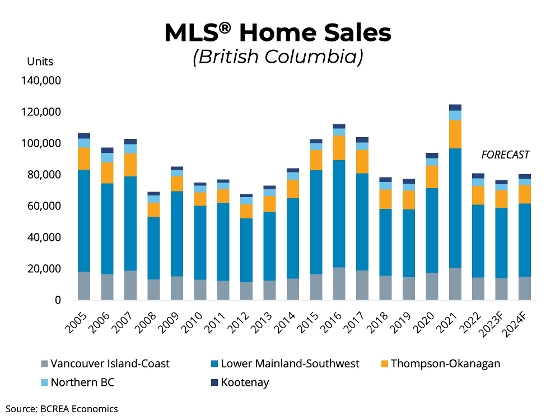On Tuesday, April 16th, the Canadian federal government unveiled the 2024 budget. The annual fiscal announcement detailed dozens of new and ongoing initiatives aimed at creating new housing, along with policies targeted at making renting and home ownership more affordable for Canadians.
Here are eight standout housing policies announced in this year’s budget:
Canadian Renters’ Bill of Rights
More Canadians are renting for longer periods of time before they transition into home ownership. The 2024 budget announced several measures intended to effectively protect tenants and strengthen their path to buying real estate.
Budget 2024 announced the creation of the Canadian Renters’ Bill of Rights, which proposes a nationwide standard lease agreement and would require landlords to disclose rental price history on properties. Through the Canadian Mortgage Charter, the Budget also calls on banks and lenders to allow tenants to report their rental payment history to credit bureaus in order to better their credit scores, thereby strengthening their future mortgage applications.
Additionally, $15 million over five years has been allocated to a Tenant Protection Fund, which will provide legal support to tenants.
Funding for the construction of new homes
The federal government is promising billions of dollars in spending toward the construction of new housing.
The 2024 budget unveiled the Canada Builds initiative, which will enable the country’s Apartment Construction Loan Program to partner with provincial governments in order to build more rental accommodation. Starting next year, the program will receive $15 billion in additional funding for the creation of 30,000 new homes, topping up the program’s current funding allocation to over $55 billion for a total of 131,000 units, set to be built by 2031.
The Canadian Housing and Mortgage Corporation’s (CMHC) Housing Accelerator Fund will also receive $400 million in financial support to build 12,000 new housing units.
Infrastructure Canada will receive $6 billion over the next decade towards the Canada Housing Infrastructure Fund, which will support the creation of water and waste infrastructure needed for new communities. $100 million over two years will also be dedicated to Employment and Social Development Canada to support apprenticeship and skilled-trade programs that address the workforce shortage needed to build housing.
30-year mortgage amortizations for first-time buyers of new homes
Through the Canadian Mortgage Charter, the 2024 budget announced that starting on August 1st, first-time buyers purchasing a newly constructed home can access 30-year mortgage amortizations, a product that has previously only been available to those with a down payment of at least 20%.
In practice, a longer amortization period would allow borrowers to pay off their mortgage over an extended timeline, thereby reducing their monthly payments.
Amendments to the Home Buyers’ Plan
Saving for a down payment is one of the largest hurdles new homebuyers face. To make it easier to access funds for a home purchase, Budget 2024 unveiled an amendment to the withdrawal limit on the Home Buyers’ Plan, which has been increased from $35,000 to $60,000 as of April 16th.
Support for single-family home suites
To encourage the creation of secondary housing units, the 2024 budget announced $409.6 million over four years towards a Canada Secondary Suite Loan Program, run by the CMHC. This will enable homeowners to borrow up to $40,000 in low-interest loans towards the cost of adding a secondary suite to their homes, which can be used for multi-generational living purposes or as a source of rental income.
Increase to the inclusion rate on capital gains above $250,000
Effective June 25th, Budget 2024 proposes an increase to the inclusion rate on capital gains realized annually above $250,000 by individuals, corporations, and trusts from one-half to two-thirds, by amending the Income Tax Act. This would include the sale of secondary residences and investment properties.
Currently, only 50% of capital gains are taxable. The 2024 budget would increase the inclusion rate to 66% on capital gains above $250,000. The sale of principal residences will continue to be exempt from capital gains tax.
New funds for post-war housing catalog
In December 2023, the federal government announced that it would be modernizing its post-war home design catalog, providing standardized home blueprints that would accelerate the creation of much-needed housing. The 2024 budget unveiled $11.6 million towards the development of 50 home designs, which includes plans for row homes, fourplexes, sixplexes, accessory units, and modular homes.
Conversion of public lands into housing
Land scarcity is one of the main barriers to the creation of new housing. The federal government intends to utilize public lands in order to free up space where new housing can be built, with a goal of building 250,000 new homes by 2031 under the Public Lands for Homes Plan. In Budget 2024, the government announced plans to lease public land to builders in order to lower capital costs and review the federal lands portfolio to identify more usable lands for housing. The budget also outlines plans to reduce the footprint of federal office buildings and convert these spaces into housing.
Over the next three years, $5 million will be allocated to the Canada Lands Company to support initiatives to build properties on public lands.
*Information provided by Michelle McNally
Communications manager, Royal LePage











